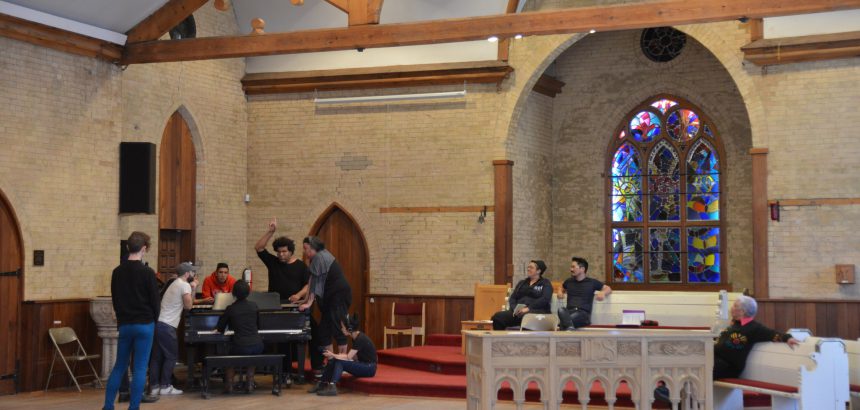Michel Marc Bouchard’s 1987 play Lilies Or, The Revival of a Romantic Drama (Les Feluettes) is getting a reimagining to help close off Buddies’ 40th anniversary season. This new production of Lilies, a play set in a Quebec prison in 1952, features a cast entirely of queer men of colour, with a few changes to accommodate the 2019 cast. It was all done with the support and blessing of Bouchard, according to director Cole Alvis and lemonTree artistic associate (and Lilies performer) Ryan G. Hinds, with whom I spoke while attending a rehearsal before the team moved into the theatre.
The casting choice reflects the disproportionate representation of Indigenous and Black communities in both federal and provincial prisons. According to Statistics Canada, though Indigenous people make up approximately 4.1% of the Canadian population, they account for 27% of those in federal prisons. In provinces like Manitoba where Indigenous population sits around 15%, 74% of prisoners are Indigenous. Meanwhile, Black communities make up 3% of Canada and over 8% of the prison population. The representation of queer men specifically is not accounted for. Given that the RCMP was created to enforce colonial rule, none of these statistics (and lack thereof) should come as much of a surprise.
With these stats in mind, going into rehearsal, I knew to expect a few changes from the original text, but wasn’t sure what they would be. Director Cole Alvis explained that there would be some new scenes – some were from the film script that didn’t make it into the final cut, and others were devised – and that Yolanda Bonnell had written some poetry that would be included. But at its core it is still a drama centred around prisoners putting on a play with the intent to find truth and justice for the wrongfully imprisoned Simon. The room felt electric waiting for the run-through to begin, something new and exciting was being birthed before me, with Walter Borden’s voice filling the rehearsal space.
With a cast that featuring predominantly Indigenous and Black actors, the power dynamics look very different. Though retribution is a theme in Lilies, it’s mediated by the marginalized groups impacted by the crimes central to the story – not those imposing colonial rule through the church and criminal justice systems. Even in this early run though, it was apparent that Simon has ownership of his story while he speaks to a greater societal problem in our supposed justice system. While the inmates attempt to exact retribution through the play, the power in telling his story is Simon speaking truth to power (so to speak), exposing flaws in a punitive system, which transforms into a kind of restorative justice for Simon and the whole cast. Vallier might no longer exist in the physical world, and Simon might still be wrongfully imprisoned, but their story was told, the colonial rule is exposed and indicted for the cruelty it enforced (and continues to) upon queer men of colour.
With identity-conscious casting, a whole new world is imagined, one where communities might hold accountable a system that fails so many. Something as simple as an Indigenous-cast Countess, who would prefer a gay son over one having a job, turns the absurdities of settler/colonial rule into a laughable caricature without any downward punches. The impact was immediate and biting, exposing nuances easily overlooked in a more mixed cast, all the while the rehearsal was just beginning to bring the staging of the story into focus.
After rehearsal, Alvis spoke with me about challenges that came with casting Indigenous artists specifically. The theme of Indigenous suicide and death is addressed in this production – something that is all too common in our communities and not something that Alvis took lightly. With careful consideration and a furrowed brow, they explain the importance of keeping true to Indigenous beliefs that there is no distinction between the worlds of the living and dead. All of characters who die hold a role in holding the Bishop accountable for his actions so many years before.
“We are centring Indigenous and Black artists and communities although we don’t have a 100% Indigenous and Black cast (intentionally to represent Bilodeau’s assimilation into whiteness that rewards him by making him a Bishop).” Says Alvis. “It’s meant to be a slap to the Bishop when Simon is introducing the cast and says (when referencing [Albanian born] Indrit), ‘and that little sneak is you.’ Plus it helps that Indrit is playing a guard to represent white culture as having a role to play, putting themselves on the line, to support community justice.”
Every choice was carefully weighed, with a strong sense of responsibility to not only the queer and IBPOC communities to which the cast and creative team belong, but also to the playwright, Bouchard. This balance of respect and desire to challenge deeply ingrained beliefs was fuelling the energy that struck me upon arrival.
Hinds, who had been pressing for Lilies for about 25 years now, said “I kept meeting people who loved it but didn’t want to do it because it was ‘too gay’, ‘too sexual’, ‘too French’, or ‘too expensive’… [and] some well known companies in Canada declined to do it. Thus, Lilies is a bold choice to help close out Buddies 40th anniversary season, something Hinds points out was coincidental. Reflecting on rehearsal, it feels more serendipitous than mere coincidence.
Lilies rehearsal photo by Greg Wong


